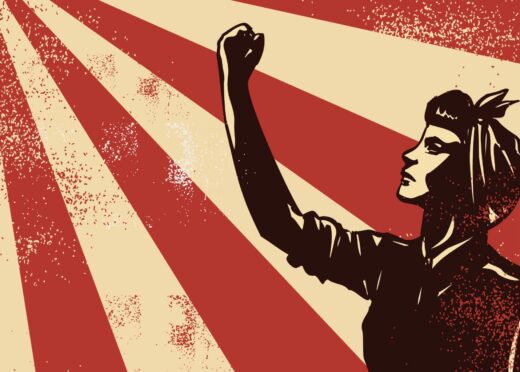
It came as no surprise to Dr Kareena McAloney when her research found that women have proved to be far more resilient than men during the long months of lockdown.
For the academic has herself endured and survived after a horrendously difficult childhood when a car crash left her unable to walk and in a wheelchair for six years.
She was also a child of the Troubles when Northern Ireland was riven by violence and troops on the streets.
So she was not shocked when research into the psychological impact of the first three months of lockdown last year suggested men were far more likely to suffer enduring traumatic stress than women.
“Our survey on the impact of the coronavirus on mental health found that women were more resilient than men by 64%,” said McAloney, senior psychology lecturer at Glasgow Caledonian University (GCU).
“While women started off more anxious, they improved significantly more than men and had lower levels of post-traumatic stress disorder (PTSD), so there seems to be something protective about being female.
“This bears out my own experience when I was in a car crash as a child and had to learn to walk three times after several major operations. It was my mother who kept our family going after the accident while my dad and brother fell apart,” she added.
“The findings didn’t surprise me as women hold families together because they tend to take on caring roles and just get on with it. They focus on looking after other people, not on their own worries.
“But we don’t know if there will be a delayed impact on their mental health after we have got through the worst of Covid. Certainly, it was only after I had recovered and was able to walk unaided once more that my mother realised how much stress she had been under.”
At the age of 11, McAloney was hit by a speeding driver who went through a red light. Her right leg was shattered, her left leg and pelvis broken.
“I had fractures all over my body four metal rods attached to pins in my right leg and spent six years in a wheelchair,” she said. “I was never supposed to walk again.
“My mum carried us through it all for years as she focused on keeping everyone going. It was years later, when I started to walk again that my mum started to show the toll it had on her. Even worse, this all happened in Northern Ireland during the Troubles.”
Now, aged 40, she has no outward signs of her accident but she has arthritis, balance problems, neural damage down one side of her body, and amnesia.
“The first thing I remember in my life is being hit by that car. I don’t remember anything before the accident,” she said.
Despite her difficulties as a child, she was a keen student and soon caught up at school, where she excelled. Now a respected academic, she co-authored with GCU’s head of psychology, Dr Kerri McPherson, on the Covid Psychological Wellbeing Study, which was conducted with colleagues from Queen’s University Belfast.
The aims of the study of about 2,000 people were to identify patterns of anxiety, depression and Covid- related traumatic stress symptoms in the 12 weeks following the first national lockdown in March 2020.
“Two-thirds of the sample reported mental health symptoms that are indicative of considerable resilience to the unprecedented demands of lockdown,” said Dr McPherson.
“However, around one-fifth of the sample had clinically significant anxiety and depression symptoms and one-sixth had elevated Covid-related traumatic stress symptoms suggestive of difficulties adjusting to the pandemic.
“These rates are considerably higher than reported in UK samples pre-pandemic and they reinforce the need for additional mental health support for the adult population in the recovery phase and beyond.”
The study found that loneliness increased the risk of experiencing clinically significant depression in the first four weeks of lockdown, and that younger people were more vulnerable than older generations.
“The older generation has gone through many other traumatic events and are more stoic, while younger ones are in a transition phase between school and work, while socialising is more important to them than it is for older people,” said McAloney.
“Gender wasn’t a risk factor for depression, but it was for anxiety,” added McPherson. “Females were more likely to have clinically significant anxiety scores at the start of lockdown, but they also showed improvement over time.
“Being female was protective in relation to Covid-related traumatic stress, which may reflect a gendered response to the evidence that males experience worse Covid morbidity and higher mortality than females.
“This is one of the first studies to report that Covid had a different impact on the mental health of groups of people living in the UK population in the first 12 weeks of the first lockdown.
“Some people experienced poor mental health throughout, some were more vulnerable in the early weeks, and for others vulnerability was delayed. Different interventions may be needed to support people in different ways.”

Enjoy the convenience of having The Sunday Post delivered as a digital ePaper straight to your smartphone, tablet or computer.
Subscribe for only £5.49 a month and enjoy all the benefits of the printed paper as a digital replica.
Subscribe